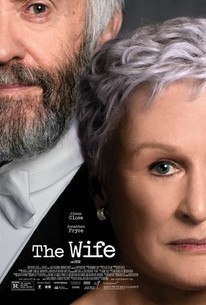

Charlyne Gelt Ph.D.
Connections!
Upcoming Events
Chapter News
Nikki Gabriel
President's Message
Read
Ariel Cohen
CAMFT Facebook Page
Legislative Updates
Read
Kirstin Carl
November Membership
Meeting Write-Up
Read
October Board Minutes
Read
November Board Minutes
Read
Member Columnists
Charlyne Gelt
The Wife
Read
Contributors
Shirin Peykar
5 Ways to Become a
Mindful Parent Today
Read
Member Highlight
Kent Toussaint
Read
Sponsors
Newport Academy
Read
eBlasts
December 2018 eBlasts
Read
January 2019 eBlasts
Read
Contact Us
Read
Cinema Therapy — Charlyne Gelt, Ph.D.
The Wife
The Wife, based on the novel by the same name by Meg Wolitzer, takes us on one woman’s journey from professional helplessness to self-discovery, and ultimately empowerment. The film stars Glenn Close as “the wife” (Joan), Jonathan Pryce as her author husband (Joe), Max Irons as their angry adult son (David), and Christian Slater (Nathaniel) as Joe’s pushy wanna-be biographer.
The Nameless “Wife”
Our heroine’s story reflects one that was shaped by our sense of a woman’s world of the late 1950s through 2000, a scenario that begins to unravel for Joan when, after thirty-plus years of marriage, she accompanies her husband to Stockholm to receive the Nobel Prize for literature for his body of work which, we later learn, was actually written by Joan.
 The film creates an awareness of the challenges that faced talented women of that era when they tried to succeed in a man’s world. Too often they ended up giving their talent away to an inept, less talented man who took credit and left the woman standing in his shadow. Many young women today may not know or appreciate what a struggle it was for earlier generations of women to get professional recognition based on their own merit, capabilities, and value! Most could only achieve their potential by living vicariously through the successes of the their spouse.
The film creates an awareness of the challenges that faced talented women of that era when they tried to succeed in a man’s world. Too often they ended up giving their talent away to an inept, less talented man who took credit and left the woman standing in his shadow. Many young women today may not know or appreciate what a struggle it was for earlier generations of women to get professional recognition based on their own merit, capabilities, and value! Most could only achieve their potential by living vicariously through the successes of the their spouse.
The Wife interweaves dual time frames, the couple's youthful passion and ambition and what happens to them over time. Their initial coupling is built on a classic #metoo situation: Joe, a married-with-child writing instructor, falls for and marries his more-talented student, Joan. Joe recognizes Joan’s writing as superior to his own and uses her to meet his need for achievement and success as a Great American Novelist. Joan’s naivety and desire for success make her an easy target of his seduction. She learns to play it, then takes a back seat to him. Joan is the “Golden Girl” whom he both admires and resents for her talent ― which he lacks. She subjugates her own talent to support him, armors him with self-confidence to quiet his anxiety and inadequacy, soothes his frazzled, panicky, fragmented sense of self, and helps him realize his goal of becoming a highly respected published author. Over their thirty-plus years of marriage, we learn about the pain of their secrets, betrayals, and deceptions.
When Joe achieves global recognition for his writing, he minimizes, ignores, and discounts Joan’s support. She is now acutely aware how she has allowed herself to be used and cast off as a loyal pet. In the end, resentment towards her husband’s social recognition and her role as only “the wife” overrides her armored facade. She manages to wear her “game face” throughout the fascinating scenes of the actual Nobel Prize event in Stockholm, but finally sneaks out for a drink with Nathanial, the snoopy wanna-be Joe biographer, and ends up saying too much, which unleashes her anger that she has stayed overtime in the passenger seat of her marriage. Something has to give!
Back in their hotel room after Joe has received the coveted Nobel Prize for Literature, Joan blindsides Joe by telling him she has decided to divorce him. Joe completely falls apart. He collapses from a heart attack. Still conscious, he questions aloud if Joan has ever really loved him. Then he utters his last words, “Now I’ll never know,” as he dies.
Joan, horrified, remains her stoic self and maintains her role as Joe’s protector by threatening to take his biographer, Nathanial, to court if he tries to malign Joe’s reputation or expose anything she had told him over a drink. In the final scene Joan shifts into a new self-confident role, dropping her armor with her son, David, telling him she will reveal the whole truth to him one day ― privately. In the end, we recognize that Joan, like so many other strong, talented women, has been the glue that held together Joe’s fragile sense of self. However, this time Joan can’t pick up Joe’s broken pieces and put him back together again, but she can pick herself up and move on. In a symbolic visual, she takes out a blank pad of paper and a pen and ― the promise of writing ― for herself, is clearly in her future. She reverses the wheel of history.
Psychological Perspectives.
From a therapeutic perspective, a couple’s dynamic is best understood by looking at each partner’s unconscious role in a dysfunctional relationship.
In The Wife, we see a marriage set against the backdrop of an era when women took a back seat in order to support the success of their spouse. Thus, they achieved their own security and social success. Joan made a deal that held her captive for many years: accept “long-term enslavement” in exchange for wealth, fame and recognition through Joe.
The down side of co-creating such a marital bond is that it reinforces dynamics of dominance and submission which progressively devours one partner’s inherent potential in order to serve the needs of the other. While sex appeal and beauty have been a traditional source of power for women in such marriages, in The Wife, it is Joan’s ability to turn a story into a literary masterpiece.
The Wife raises many provocative questions, among them: What impact does “a woman’s role” have on a marriage, on the children, then and now? Where does love fit in? “Do I have to give up me?” “What’s wrong with this picture?” Today, when one partner pursues their own talent or dream what assumptions, accommodations or sacrifices are made? Must one dream be sacrificed to ensure the other’s need for achievement and success? Today, in healthy adult relationships, we are more likely to ask, where is the reciprocity?
Golden Handcuffs
Therapists who treat couples look past the crisis, the presenting problem that brought them into therapy in the first place. Therapists look into the “hidden agreements” or “contracts” couples make with each other which may be the source of their pain. How are these “golden handcuffs” holding them together? Or is something not working?
In The Wife, we witness the couple’s dynamics of dominance, submission and pervasive sexism and how these dynamics permeate into the family system. In this case, David an unwitting victim of his father’s insecurity dangles like a puppet hoping for his father’s approval and acceptance. We feel Joan’s resentment. Joe uses Joan to feed his narcissistic need for fame and prestige. Joan uses Joe’s male gender to get her writing published. Through him, she achieves recognition as a writer, even though public acknowledgement is given only to Joe. It appears to be enough for the 1950s Joan. In that era, women often made these choices because they didn’t see other ways to succeed, get financial security and a comfortable lifestyle. Working as a “WE,” many momma-papa teams ensured the family’s success and outwardly no one was damaged, only strengthened.
On the outside, it looks as though Joan and Joe’s arrangement worked. Together, as partners, they achieved the American dream, the perfect family of a successful husband and his steadfastly supportive wife. In defense, Joe says, “I watched the children, so you could write!” As per their contract, Joan wrote, and Joe got the glory. That’s what finally began to grate on her: his manipulations, narcissistic ego needs, #metoo flirtations, and ignorant unawareness at squashing Joan’s dream of writing for herself. That changed when in Stockholm, so Joe could accept the Noble Prize for what she had written. It was the last straw! It was the trigger that unleashed Joan’s years of buried anger and resentment. Tired of playing mute, Joan rewrites the contract ― emancipation! Finally, she recognizes her worth, her “gold” and what it cost to give it away.
To Change the Future, Change the Story
We live and build our lives by stories, including those handed down over multi-generations. To change the future, change the story. Joan decided to leave her marriage, unaware that her announcement of her intention to divorce Joe would result in his death. She did not go from “supportive wife” to “grieving widow.” She changed from the inside out. Empowered by her vicarious success, and liberated by her new-found sense of self, she changed her role, her story, and her future.
The Wife is a brilliant metaphor for the social and cultural disparity between genders that still exists today. Life is a selection of anecdotes and incidents that together weave a story. Many twists and bends are in each tale. Joan declared it is "time to turn the page," and you cannot know the tale in its entirety until the end.
Charlyne Gelt, Ph.D. (PSY22909) is a clinical psychologist who practices in Encino. She leads Women's
Empowerment Groups that help women learn the tools to move beyond self-destructive relationship patterns.
She may be reached at 818.501.4123 or cgelt@earthlink.net. Her website is www.drgelt.com. Her office address is
16055 Ventura Blvd. #1129 Encino, CA 91436.